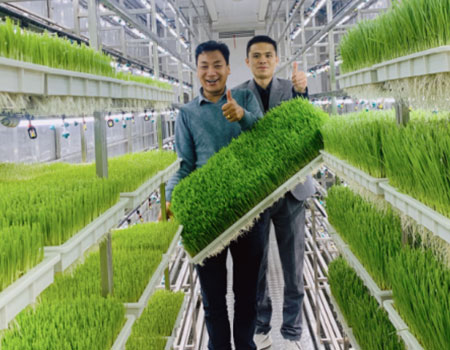When it comes to Portugal, our first impression is that it is a major wine country. Portugal is the tenth largest wine producing country in the world and the fifth largest wine producing country in Europe. The Portuguese grape planting area is approximately 239000 hectares, with approximately 340 varieties. Portugal's agricultural advantage lies in its large arable land area and favorable climate conditions, making its agricultural products very abundant. Grapes are not the main crop in Portugal. Cereals (wheat, barley, corn, and rice), potatoes, grapes (used for wine making), olives, tomatoes, beets, and so on are all suitable for cultivation in Portugal.
Developing hydroponic agriculture in Portugal is a revolutionary technology that subverts traditional agriculture. Hydroponic agriculture refers to the cultivation of plants in water, using dissolved nutrient solutions to provide them with the necessary nutrients, rather than traditional soil cultivation methods. This technology has been widely used in Portugal, not only to improve crop yield and quality, but also to save water and reduce the use of fertilizers.

The advantage of hydroponic technology is that it can control the nutrients and water required for plant growth, thereby improving the yield and quality of crops. In addition, hydroponic agriculture can also avoid soil borne diseases and pests, making crops healthier and safer. In addition, hydroponic technology can also save water because it can reuse water in the recycling system and reduce the use of fertilizers, as the nutrient solution already contains the nutrients required by plants.
In hydroponic agriculture, small-scale hydroponic planting equipment such as hydroponic tower systems, NFT systems, ZIP systems, etc. can be used for household planting. Large hydroponic agriculture can be achieved through hydroponic greenhouses or container farms. Portugal's hydroponic agriculture has begun to be applied to various crops, including vegetables, fruits, and herbs. One of the most successful applications is the cultivation of tomatoes.

Tomatoes are one of the most important agricultural products in Portugal, but due to limitations in climate and soil conditions, traditional cultivation methods find it difficult to achieve the desired yield and quality. The hydroponic tower system and Dutch bucket are soilless planting equipment that can successfully achieve high yield and quality in tomato cultivation. Through hydroponic cultivation technology, the yield of tomatoes has increased by more than 30%, and their quality has also been significantly improved.
In addition to tomatoes, Portugal's hydroponic agriculture is also applied to other crops, such as cucumbers, chilies, strawberries, etc. These crops grow healthier and faster in a hydroponic environment, while also maintaining better quality and taste.
Portugal's hydroponic agriculture is a revolutionary technology that can increase crop yield and quality, save water, and reduce the use of fertilizers. This technology has been applied to various crops and has achieved significant success. With the continuous progress of technology, it is believed that hydroponic agriculture will be more widely applied in the future.









